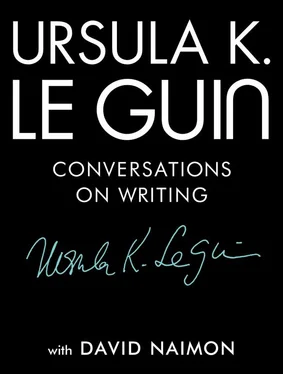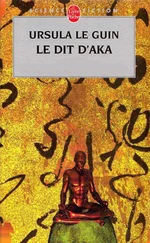UKL:I don’t know if you can call language “technology.” Technology is really involved with tools. Language is something we emit and we have to learn it at a certain period or we can’t. Language is strange .
DN:In that same speech you talk about your mutual love of science and poetry, how science explicates and poetry implicates. Can you talk more about this, and about your desire to subjectify the universe? I know normally, when people think of subjectification, they think of something interior, maybe even self-referential, but here you’re seeing it as a path toward reaching out.
UKL:There was an article by Frans de Waal in the New York Times about tickling bonobo apes and getting the complete, as it were, human response, of giggling, of drawing away but wanting more, and so on. A marvelous, subtle article. Many scientists want to objectify our relationship with animals and so we cannot say that the little ape is acting just the way a little human would. No, it’s responding only in ape fashion. We mustn’t use human words, we mustn’t anthropomorphize. And as de Waal points out, there’s this kind of terror of fellowship. We can’t, we’re not to, have fellow feeling with an ape or a mouse. But where’s poetry without fellow feeling?
FROM THE FOREWORD TO
Late in the Day
• • •
Poetry is the human language that can try to say what a tree or a river is , that is, to speak humanly for it , in both senses of the word “for.” A poem can do so by relating the quality of an individual human relationship to a thing, a rock or river or tree, or simply by describing the thing as truthfully as possible.
Science describes accurately from outside, poetry describes accurately from inside. Science explicates, poetry implicates. Both celebrate what they describe. We need the languages of both science and poetry to save us from merely stockpiling endless “information” that fails to inform our ignorance or our irresponsibility.
DN:You have a poem, “Contemplation at McCoy Creek,” that deals with this issue of subjectifying the universe, of reaching outward, really well.
UKL:It’s a kind of philosophical poem, and I will say a word about it. I was out in Harney County without a library, wondering what the word contemplation means. It seems to have the word temple in it, and the prefix con means “together,” you know. So that is where I started, and then—this will explain the middle of the poem—there was a book in the ranch house, a kind of encyclopedia-dictionary, and it had a very good essay on the word contemplation . So it was sort of a learning experience, this poem.
DN:There is a line at the beginning of that poem—“seeking the sense within the word”—that reminded me of something you said in an interview with Poetry Society of America . They had a column called “First Loves,” where they asked poets to talk about their first exposure to poetry. You talked about a collection of narrative poems, Lays of Ancient Rome by Thomas Babington Macaulay, and also about the poems of Swinburne, how you learned through those poems that you could tell stories through poems, but also that the stories are often beyond the meaning of the words themselves, that there is a deeper meaning of story that comes from the beat and the music of the words, not from the meaning of the individual words. Can you talk about that a little bit?
• • •
Contemplation at McCoy Creek
Seeking the sense within the word, I guessed:
To be there in the sacred place,
the temple. To witness fully, and be thus
the altar of the thing witnessed.
In shade beside the creek I contemplate
how the great waters coming from the heights
early this summer changed the watercourse.
The four big midstream boulders stayed in place.
The willows are some thriving and some dead,
rooted in, uprooted by the flood.
Over the valley in the radiant light
a raven takes its way from east to west;
shadow wings across the rimrock pass
as silent as the raven. Contemplation
shows me nothing discontinuous.
When I looked in the book I found:
Time is the temple—Time itself and Space—
observed, marked out, to make the sacred place
on the four-quartered sky, the inwalled ground.
To join in continuity, the mind
follows the water, shadows the birds,
observes the unmoved rock, the subtle flight.
Slowly, in silence, without words,
the altar of the place and hour is raised.
Self is lost, a sacrifice to praise,
and praise itself sinks into quietness.
UKL:That deeper meaning is where poetry approaches music, because you cannot put that meaning in words in an intellectually comprehensible way. It’s just there and you know it’s there, and it is the rhythm and the beat, the music of the sound that carries it. This is extremely mysterious and rightly so.
DN:Robert Frost talks about it, or compares it to hearing somebody having a conversation on the other side of the wall. You’re able to tell what they’re saying through their intonation and their rhythm, but you don’t actually hear any of the individual words.
UKL:You can tell what they’re feeling, but you may not know really what they’re talking about. You know how they feel about it by the sound—yeah, that’s neat.
DN:When we last spoke, you also mentioned this with regard to Virginia Woolf, who I know didn’t write much poetry. Is that a similar phenomenon, do you think, what you learned when you were young with poetry, around the meaning of the sound, and what you’ve described of the meaningfulness of Woolf’s relation to sound when you write prose?
UKL:When you’re talking about the sound in the rhythm of prose, it is so different from poetry, because it’s in a way much coarser. It’s a very long beat, the rhythms of a prose work. Of course, the sentence has its rhythms too. Woolf was intensely aware of that. She has a paragraph about how rhythm is what gives her the book, but, boy, it’s hard to talk about. It’s one of these experiential things that we don’t really have a vocabulary for. I wonder if there is a vocabulary for it. It’s like talking, again, about music. You can only say so much about music and then you simply have to play it. Some person can hear it and get it or not get it.
DN:Who are some of the poets that you love as an adult? Your cherished poets?
UKL:I have to put Rilke very high. I had MacIntyre’s translation of The Duino Elegies one summer when I needed help. I was in a bad time, and I kind of feel like some of the elegies got me out of it. They carried me through it, anyway. I don’t know German. So, Rilke and Goethe I have to get with facing translations and then just work my way back and forth and back and forth. Usually I end up trying to make my own crummy translation, so I can work my way into the German words with a dictionary. That is a very laborious way of reading poetry, but boy if you do it word by word, if you don’t know the German nouns and have to look up every single one, and the verbs are mysterious and not in the right place [laughs], by the time you’ve done that, you know the poem. You’ve kind of made your own version of it in English, and that’s why I love translating from languages I do know and even from languages I don’t, like with Lao Tzu.
Читать дальше









